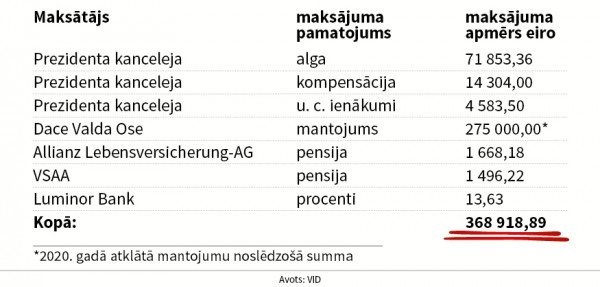The President of Latvia is supported by allowances and benefits
Egils Levits, who receives benefits from the Latvian state, needs to choose his words very carefully when advocating "targeted benefits" for those and only those "who have the hardest time".
The issue of benefits in Latvia is still gaining momentum and is trying to reach its touchpoints with the prices of food and other goods and services necessary for survival next winter. Among many other topics, it also came up in a TV interview with the President of Latvia, Egils Levits, on May 3. Anyone interested can hear and see it on the Latvian Public Media portal. If you do not want to know what Levits thought about the war in Ukraine and other interesting things, you can go straight to the President's views on granting benefits, which can be heard from 11:20 of the interview and in unedited form in writing look like this:
- I would like to stress once again that benefits must not be handed out like from a watering can. Yes, unfortunately, as before. But there should be targeted benefits, so that those who have the hardest time receive benefits and those who can pay do not need them.
No sane person could disagree with such words. That is something everyone understands, if benefits are given to everyone, which literally means giving benefits to too many, then either the benefit providers will not be able to pay out the benefits they have given, or the benefits will be paid out in worthless money that will not be able to buy or pay for the bare minimum to survive anyway. Why should the President regret that even the Latvian state as a whole has not been able to act in a way that all the citizens of the country would consider good? Because it is very difficult to apply these words to ourselves. The same people who vehemently denounce the wastefulness of the state, the ineptitude and gluttony of politicians and civil servants, and the willingness of those around them to cheat in all sorts of ways, including benefit scams, are prepared to name and defend, even with their fists, even in court, 100 and one arguments as to why they are entitled to benefits, compensation, tax relief or food parcels. Perhaps it is Levits who should be named as the most striking example of how fine words about honor and honesty, about responsibility and foresight, coexist with actions whose point is to shove everything that is not too legally tightly bound in your pockets.
It should be mentioned immediately that the accusations against Levits are based on Latvian standards, not those of African countries or Russia. The difference between Latvia and many other places in the world is so simple that here, firstly, income declarations by public officials are made at all, secondly, they are publicly available and, thirdly, they are reliable. Thank you to the state, with the President at its head, and thank you to his Chancellery and the State Revenue Service for the opportunity to ask the exact question, down to the last euro cent, whether, with a salary of over €70,000 and a total income of over €350,000 in 2021, Levits should really have received allowances worth €18,887.50 in total:

On the question of the justification for such payments, there is also the reply of the Chancellery of the President of Latvia to Neatkarīgā that "In 2021, in accordance with the legislation in force, the following has been calculated and paid to the President of Latvia Egils Levits:
- salary (gross) and health insurance costs - €71,853.36;
- reimbursement of representation expenses - €14,304.00 (20% of the monthly salary);
- business trip allowance: €4,583.50.
One of the reasons not to be satisfied with this explanation is that, according to Levits' previous income declaration, in 2020 he was able to represent and go on business trips at the expense of his salary, which is practically the same as in 2021, and at the expense of the expenses paid jointly by his chancellery, without additional cash allowances. A recent example shows that Levits' predecessor, Raimonds Vējonis, received €61,600 in salary in 2018 and about the same as Levits received last year for representation expenses. Raimonds Vējonis did not have any separate income for business trips. So the state is not burdening itself with constantly amending laws and regulations, because these laws and regulations are already made so stretchable that they allow politicians and civil servants to grab as much money as their hearts desire.
The discrepancy between Levits' calls to save public money and his own ways of grabbing public money at the first opportunity cannot be warded off by explaining that the payments of the state as an employer are quite different from the benefits paid by the state and municipalities outside the employment relationship. Such a distinction is unjustified, because nobody in the shop asks whether they are being paid in salary or in a bonus, allowance or compensation. There would be none of the problems noted in the May 3 interview in Latvia next winter if all public institutions and private companies were able to pay their employees enough to enable them and their families to eat and remain fit for work in adequately heated - and therefore paid - accommodation; if the excessive costs of commuting to work were covered. Unfortunately, many institutions and companies will not be able to afford such expenses. The state will only help people with the money left over after the wishes of Levits and his ilk have been met.
